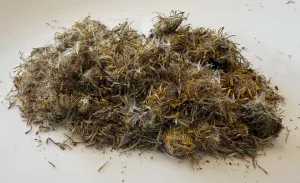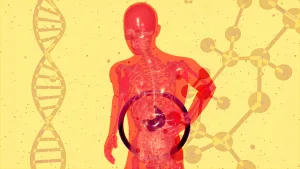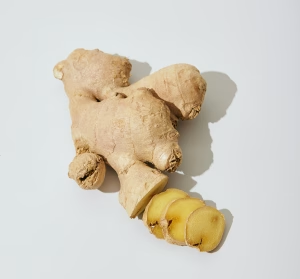Traditional Chinese Medicine
Herbal Profile: British Yellowhead
 Meet “Xuan Fu Hua,” or the British Yellowhead flower, an herb commonly used to treat acid reflux, cough, or allergies, outlined in the Divine Farmer’s Materia Medica as “salty, warm, and slightly toxic,” originally indicated for fullness below the rib sides and fright palpitations.
Meet “Xuan Fu Hua,” or the British Yellowhead flower, an herb commonly used to treat acid reflux, cough, or allergies, outlined in the Divine Farmer’s Materia Medica as “salty, warm, and slightly toxic,” originally indicated for fullness below the rib sides and fright palpitations.
Why? How does the Yellowhead flower achieve this?
Salty flavors and their chemistry have a descending action in the body—one that revolves around the manipulation and distribution of fluids—that is so pathogenic fluids can be purged, allowing for healthy fluids to be re-directed, steamed upwards where they belong.
When the heart lacks blood it is more susceptible to fright and palpitations (it isn’t only your anxiety). When the neuromuscular vessels that traverse the ribs lack fluids, we feel pain or tightness. And in many cases of acid reflux the root of the problem is not an abundance of acid, but a lack of fluids and/or electrolytes around our metabolic organs.
Yellowhead flower is not always the magic bullet for all these conditions; but when their root cause is one of gases and fluids in the body failing to descend, perpetuating a vicious cycle that is due to a void of fluids below in the first place, its formulas are a primary route we’ll hope and suspect to be effective. The opposite physiological patterns of GERD will instead be aggravated, because holistic medicine.
The chemical composition of Yellowhead flower includes quercetin, which comes from the white part of grapefruits and oranges and is often sold as a supplement to treat seasonal allergies; caffeic acid, a polyphenol found in coffee beans; and chlorogenic acid, an antioxidant that is also found in coffee beans. This makes sense as the diuretic effect of coffee is obviously a downward one in the body that subsequently lifts functional chemicals upward in turn.
Acid Reflux

There is a concept in Chinese medicine called “Counterflow qi,” which is in reference to when bodily gases or fluids move in the opposite direction from how they are intended. In the digestive process everything is supposed to move down. Don’t get me wrong—not too quickly—but down nonetheless. Any symptom of movement to the contrary is evidence of metabolic dysfunction.
Belching and burping are generally not perturbing to most of their sufferers, possibly apart from the occasional social embarrassment for loved ones. Nevertheless, they are indicative of some degree of weakness and/or inadequacy of vital substances failing to fully process something in the gut.
Vomiting is the extreme version of this, but the principle is the same. Somewhere in between is acid reflux, or “GERD” (gastro-espophageal reflux disease), which usually manifests as symptoms ranging from a burning sensation in the gut, chest, or throat, to a trapped feeling “below the heart,” as Classical Chinese texts would say. Patients experience this anywhere from once or a few times a week if they “eat something wrong,” to incessantly in every waking moment, understandably prompting them to somehow medicate, one way or another.
What causes this? Frankly, metabolic weakness and/or a lack of functional organ fluids, both of which can be caused by all the usual suspects: poor diet, stress, genetic predispositions, and long-term use of pharmaceutical medications.
Ironically, the drugs most commonly prescribed by conventional medicine for GERD, proton pump inhibitors, work by blocking stomach acid, thereby causing more physiological dryness, aggravating the root cause of the condition while muting its branch. This might be okay for a little while for those suffering from “excess patterns,” where the GERD truly is caused by excessive acid—but for those whose symptoms are due more to weakness, such medications will most likely yield a short leash.
Chinese medicine first attempts to distinguish the pattern—which kind of reflux are you? Then we treat accordingly, using acupuncture points and herbal formulas to calm the metabolic organs by imbuing them with more strength, mucosal fluids, and blood, and over time proper directionality of gases and fluids should follow suit.
In the meantime, it is advisable to eat foods that are easy to digest, such as sweet potatoes, steamed vegetables, eggs, fish, tofu, white rice, and/or pasta. Obviously, avoid as much as possible spicy foods and alcohol, refined sugar, dairy, and raw, uncooked foods. (Deep) breathing can be helpful for its inherent function to descend, as can massaging the stomach with both palms of your hands in 36 clockwise circles around the belly button. Empirical symptom management en route to unearthing the root cause of your unique pattern include DGL licorice pills if your pattern is one of weakness, or mint tea if you produce too much acid.
Happy New Year, from DFA!
 A quick re-cap on the year 2025 in the rearview, the “year-view,” if you will, otherwise “year in review” (clearly being a dad is impacting my jokes)!
A quick re-cap on the year 2025 in the rearview, the “year-view,” if you will, otherwise “year in review” (clearly being a dad is impacting my jokes)!
A lot of business as usual in the way of business—my same schedule of 3 days a week in the office, plus one supervising in the school clinic at Pacific College, partially highlighted by our appearance on Ben Aaron’s PIX-11 News segment.
I also gladly welcomed my first ever part-time assistant, Kira Schneider, a great acupuncturist in her own right, with a private practice in Princeton, New Jersey.
This year’s continuing education was also more of the same, as Chinese medicine’s foundational text, the Shang Han Za Bing Lun, takes a lifetime to study and master. In addition to reading my nightly passages, I credit Genevieve Le Goff of California, with most of the knowledge I gained last year.
In the first week of this new year I’ve added to my repertoire, virtually lecturing 2 courses per week on Classical Chinese herbal medicine with the Virginia University of Integrative Medicine, which happens to have a New Jersey campus located just a few miles from my mom.
Speaking of which, Mom’s hangin’ in there, my wife, Dr. Jillian Cohen, just got the first ever fellowship at Hackensack Meridian Health’s Integrative Medicine department approved, and daughter Peyton has since turned 4 and 4 1/4, rapidly approaching 4 1/2, and has not been made aware that she’s about to have her second trip to Disney in two years (hopefully this time sans coronavirus). She remains infatuated with everything princesses and drawing (including occasional household furniture vandalism), and her bilingual Spanish abilities are improving, inevitably to surpass my own.
Curious to hear if anyone has any exciting news from last year and/or regarding the year to come—especially if it’s something I should be sharing on my newsletter to benefit fellow clients and friends.
To Morning Exercise or Not to Morning Exercise

Patients (and students) can be good teachers, and one recently reminded me of an important premise, as she reported feeling much better since beginning to exercise in the morning upon waking, before breakfast, before doing anything else. For her, this made sense. For approximately the other half of the population it would not.
Sunrise in Chinese medicine is Shao Yang time, the time of day that corresponds, logically, with the body’s pivot, that is the system whose responsibility it is to use cortisol to bring vital substances, such as immunological or hormonal, upwards in the body. For those of us whose cortisol spikes too quickly or too early, exercise is one way to temper this surge. Interestingly, healthy food is another way. While physical movement can clear some of the inflammatory heat associated with morning cortisol, a proper breakfast of protein, unrefined sugars, and/or healthy fats can also act as an anchor to prevent it from spiking so much in the first place. For the types of people more prone to insomnia, hyperactivity, and fast metabolisms, it seems a moderate morning workout shortly followed by breakfast might be ideal.
For the opposite body type, prone to hypersomnia, chronic fatigue, and/or weight gain, a better time to exercise might be the time of day associated with the most “yang qi,” or warmth, closer to 12 noon, as these people tend to be more lacking in cortisol, as well as other excitatory chemicals, and therefore will benefit more by moving in accord with the environmental nature around them.
For those of us with small children at home, who cannot exercise upon waking, or those with jobs that preclude us from exercising just before lunch, I recommend doing what you can. Everyone is busy, but if you can find 15-30 minutes/day to get in your preferred form of movement, almost every scientific study on the subject since the beginning of scientific studies corroborate the benefit.
Black Friday & Raw Ginger

Friendly reminders for the next cold month of holiday season: To ward off cold weather most of the body’s excitatory and invigorating substances rush to the surface, thereby leaving our metabolic and endocrinological layer more vulnerable to cold and/or hypo-functionality. This can be the case even in places like Los Angeles, where the climate is relatively colder than what its inhabitants are used to.
A daily cup of ginger can warm our “more internal parts,” as to do with organs and hormones. I would recommend 3 slices, as depicted here, simmered in 3-4 cups of water for 30-40 minutes. If you’re dealing with sinus and/or respiratory issues you can use 4-5 slices, which changes the chemistry of the ginger to act more upon the lungs. If your physiological pattern includes “blood deficiency,” it is advisable to combine with a teaspoon or tablespoon of honey, or a few red dates, so as to not aggravate dryness.
Little known facts about raw ginger:
- can raise blood pressure and heart rate
- Increases stomach motility and acid secretion
- Evidenced to have an antibiotic effect against Salmonella typhi (Typhoid fever), Vibrio cholerae (Cholera), and Trichomanas vaginalis (an STD). Obviously, consult your physician. If used in such cases it should be within the context of a greater, targeted, customized formula
Second and final reminder: BLACK FRIDAY!
$50 OFF all follow up sessions and $100 off initial visits between now and New Year’s. Exclusions include those with 10 discounted session packages, those receiving superbills, and of course insurance patients.

